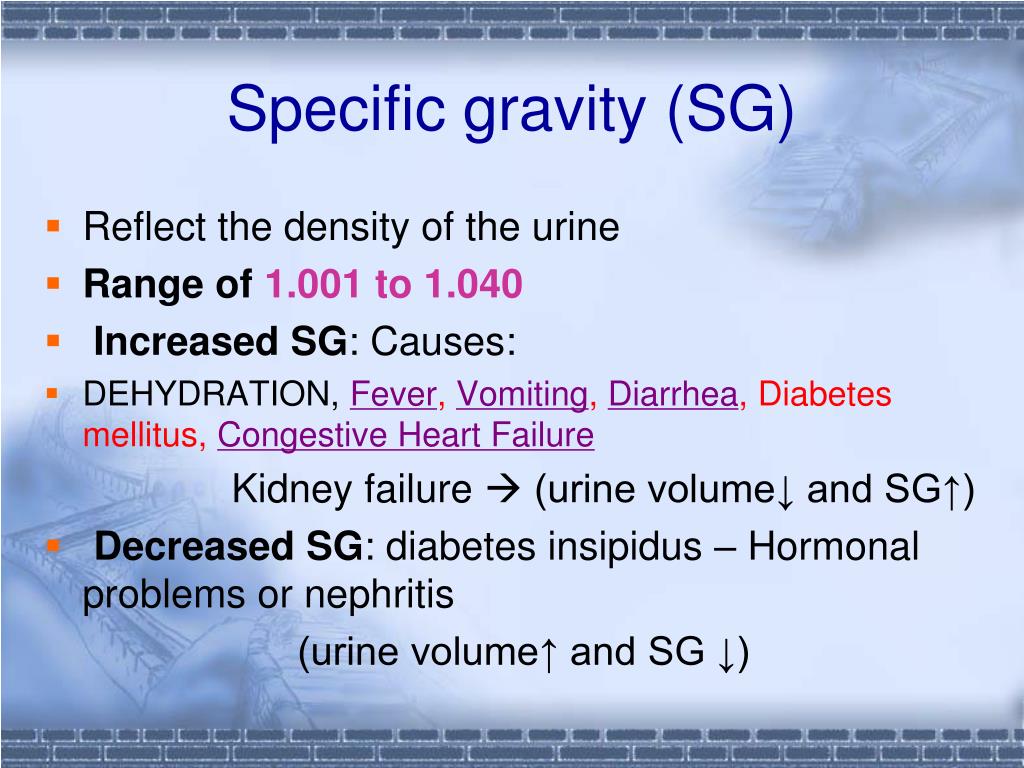

When this test is ordered, specific gravity of urine is measured by a refractometer method and includes both ionic and non-ionic solutes.Included in ionic solutes are sodium, chloride, sulfate, phosphate, and ammonium. Samples held at room temperature for more than 2 hours or samples refrigerated for more than 24 hours are not acceptable. Transport with coolant pack if coming from clinic location. Transport specimen to the University Hospital or The American Center laboratories immediately. Because urine is a solution of minerals, salts, and. For midstream urine collection instructions refer to Health Facts for you - Male HF #4247, Female HF # 4236 located on UConnect. Laboratories can now measure urine osmolarity directly, which is a more accurate indicator of urinary solutes than specific gravity. Specific gravity measures the kidneys ability to concentrate or dilute urine in relation to plasma. First urine of the morning should have USG >1.035 in cats consuming dry foods and >1.025 in cats consuming canned foods. Low specific gravity (1.001-1.003) may indicate the presence of diabetes insipidus, a disease caused by impaired functioning of antidiuretic hormone. This is usually not a cause for concern and likely indicates that you are very hydrated. Urine specific-gravity measurements normally range from 1.002. Indicate whether specimen is midstream, indwelling catheter, single catheter or other method of collection. A low urine specific gravity test indicates that the concentration of your urine is close to that of water. Urine specific gravity is a measure of the ratio of the density of urine to the density of water. Refrigerate if transportation to lab is delayed. The urine osmolality test may not be needed.Urinalysis | Specific Gravity, Urine UWHC Lab Test Detailsįirst morning void preferred. The urine specific gravity test is easier and more convenient, and is usually part of a routine urinalysis. For dogs and cats, there is a popssibility of renal failure if the value is from 1.008.

Urine osmolality is a more specific and precise test for urine concentration. Urine specific gravity represents the weight of urine when water is 1. The comparison of specific gravity values of 561 urine samples from TS. This test helps evaluate your body's water balance and urine concentration. The value of urine specific gravity in detecting diabetes insipidus in a patient. Used herbs or natural remedies, especially Chinese herbs.Received intravenous dye (contrast medium) for an imaging test, such as a CT or MRI scan.Had any type of anesthesia for an operation.surements normally range from 1.002 to 1.030.5 The NCAA. Other things can also affect the test results. refractometry, the criterion measure for urine specific gravity. DO NOT stop taking any medicine before talking to your provider. Be sure to tell your provider about all the medicines you take, including dextran and sucrose. Using this value, urine specific gravity was 72 sensitive (95. Your provider will ask you to temporarily stop taking any medicines that may affect the test results. Based on the ROC, we determined the cut off value for urine specific gravity to be 1.022. Your provider may tell you that you need to limit your fluid intake 12 to 14 hours before the test. For a more accurate result, your provider may send your urine sample to a lab. The dipstick test gives only a rough result. The color the dipstick changes to will tell the provider the specific gravity of your urine. The health care provider uses a dipstick made with a color-sensitive pad. Specific Gravity, Urine - The specific gravity of urine is used to obtain information about the state of the kidney and the state of hydration of the. Urine specific gravity is a laboratory test that shows the total concentration of all chemical particles in the urine.Īfter you provide a urine sample, it is tested right away. Urine specific gravity test Urine density


 0 kommentar(er)
0 kommentar(er)
